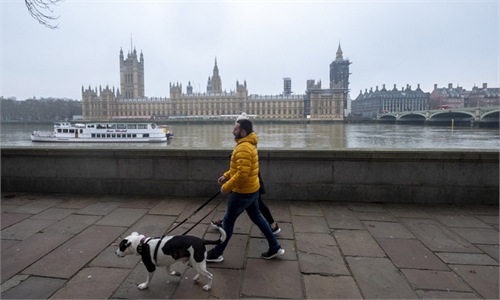COMMENTS / EXPERT ASSESSMENT
‘Decoupling from China’ costly for UK mired in virus, Brexit

Illustration: Tang Tengfei/GT
The long-awaited post-Brexit era of the UK has not got off to a smooth start, dipping further down into the coronavirus crisis and a continuously bumpy post-Brexit road may make the pain even worse. Meanwhile, some ideology-skewed British politicians have chosen to turn the country from a European spoiler into a global one by playing up the so-called decoupling China theory, at a potential cost of a dimmer prospect of its recessionary economy.Nigel Farage, a veteran Eurosceptic and a hard-right politician recently claimed that China was "a bigger threat to [the UK's] independence than EU" and the UK should no longer "depend" on China.
With a newly emerged virus variant crisis, the UK entered a new round of national lockdowns and has only a slim hope of boosting its economic recovery in short term, added with an unavoidable hard blow from a split from the EU bloc.
Though the EU and UK concluded an agreement at the last minute, some critical issues remain unaddressed and it is inevitable for the UK to face higher cost and more complicated procedures when it comes to cross-border trade or personnel exchange.
For instance, the UK purchases about half of its food from abroad, mainly from the EU. Supermarkets have seen empty shelves and some McDonald's stores even issued food shortage warning due to supply challenges following Brexit, according to local media reports. British multinationals, its high-profile financial service sector and the country's global standing will all face headwinds.
As one of the hardest hit country by the pandemic in Europe, the UK economy was estimated to plunge by about 10 percent in 2020 which could be the largest fall in its output for 300 years. The ambitious goal of a "global Britain," however, is anything but an easy task for the nation.
Struggling in the COVID-19 and Brexit quagmire, some British politicians did not slow down their ideological approach, from planning to send aircraft carriers to the South China Sea to following the Trump administration to play up the "decoupling China" theory which has been proved to be an irrational pipedream.
In fact, pursuing wider markets including China and India was one of the reasons cited by Brexit campaign, so that UK can launch trade deal talks with other major economies independently. Even Farage posted a tweet in 2015 praising the China-Australia FTA and describing it as "another example of what can be achieved as an independent nation."
With populism taking root in the UK, London has ended the "golden era" in relationship with China, alongside its increasingly hard journey to reach a trade deal with the US. However, facts speak louder than words. A recent survey conducted by the British Chamber of Commerce in China revealed that over 80 percent of UK businesses operating in China have no plans to scale back investment in China and they are optimistic for the Chinese market in spite of rising conflicts between the two nations.
Similar results have been concluded among US and Japanese businesses too. Not to mention that the newly completed China-EU investment treaty talks will gradually open the colossal Chinese market to many EU firms, including in the financial sector.
Calling 2021 as a "hugely important year for global Britain," British Prime Minister Boris Johnson may find a very tough road ahead if the country sticks to a cold war mindset, rather than getting back on track with pragmatic approaches to boost economic recovery from the dreadful recession.
The article was compiled based on an interview with Wang Yiwei, Jean Monnet Chair Professor and Director of European Studies at Remin University of China. bizopinion@globaltimes.com.cn



